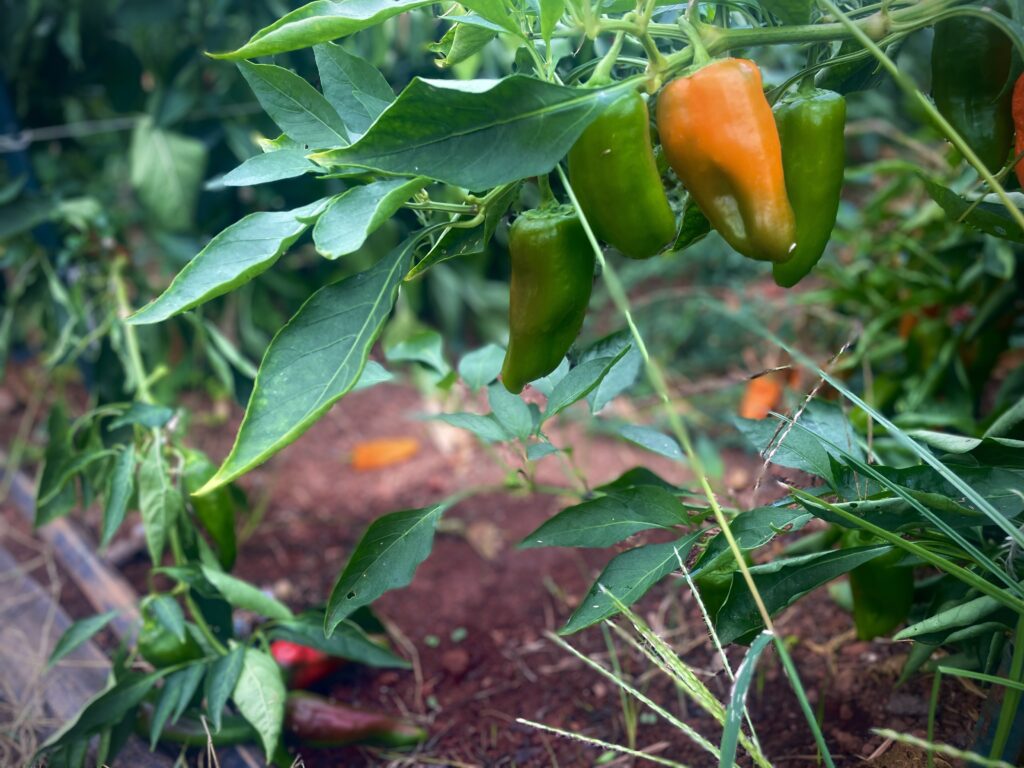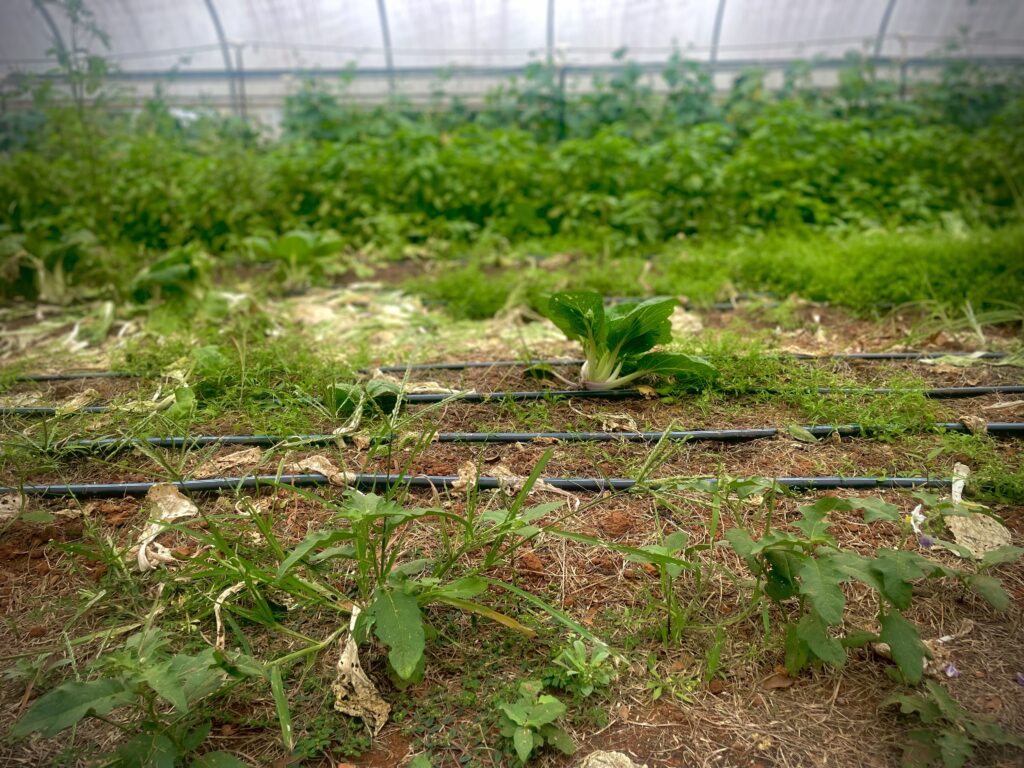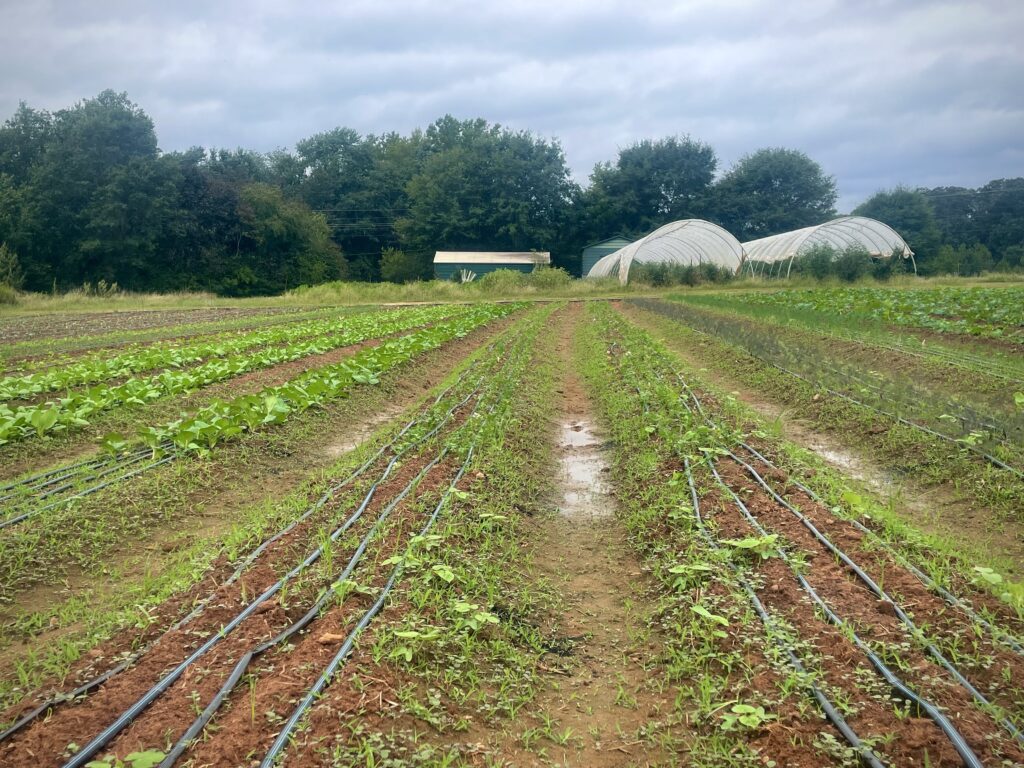
The chirping of crickets and katydids echoed through the dense fields of vegetables, flowers and fruits at Diamond Hill Farm, patiently waiting for harvest. Carolyn Shew, communications manager at the farm, marched through the rows of produce, pointing out crops along the way.
“We have blueberries here… they don’t produce a whole lot because they’re still young,” Shew said.
Though Shew manages communication for the farm, she also participates in its day-to-day cultivation. Diamond Hill Farm is certified through Certified Naturally Grown farming, a peer review certification for ecological farmers. Like many other small-scale sustainable farms, Diamond Hill Farm is grappling with the growing challenges of climate change.
In 2023, Georgia lost 90% of its peach harvest due to unseasonal weather. An abnormally warm winter caused peach plants to bloom early, only for a late spring frost to kill most of the crop.
Peaches are not the only crop climate change-induced frost could take from Georgia farmers. Pam Knox, agricultural climatologist and director of the University of Georgia Weather Network, says blueberries are also vulnerable.
“Blueberries are a much bigger crop in Georgia than peaches. Both of those crops are very susceptible to spring frost. The timing’s a little different, but last year we lost a lot of blueberries because we had a frost that was more aligned with the blueberry development,” Knox said.
To combat frost, some farmers use sprinklers to coat crops in water, which releases small amounts of heat as it freezes, maintaining the surrounding air temperature around 32 degrees Fahrenheit. Wealthier farmers use heaters, fans or even helicopters to circulate warmer air throughout their orchards.
However, these methods are expensive, and local farmers do not always have the resources to warm their crops. Climate change also causes greater temperature fluctuations throughout the season. Farmers are finding it harder to predict when frosts will occur.
Unpredictable weather became a serious challenge in 2023 at Diamond Hill Farm.
“It would be in the 90s for two days, and then it would torrentially downpour for four days, and then it would freeze,” Shew said. “It was a miracle that some of our crops survived — a lot of them didn’t.”
Temperature fluctuations are not the only issue. In recent years, rainfall changes caused by climate change have also made farming more difficult. Historically, precipitation in northeast Georgia has seen 45 to 50 inches of rainfall per year, and that number hasn’t changed dramatically. What has changed is the distribution — extreme droughts and floods are becoming more common.
During droughts, small farms without irrigation systems struggle. Diamond Hill uses a simple drip irrigation system to keep crops healthy, but even that could not save their dahlia field, which dried out in the heat.

Flooding has become just as dangerous. Shew noted that low-lying areas of the farm are susceptible to flooding, which will kill plants by drowning their roots. Shew went on to say that this year’s hurricane season “hasn’t been that bad” and Diamond Hill is still hoping for the best.
The Unpredictability of Hurricane Season
As climate change intensifies, hurricanes are becoming a more serious threat to Georgia farms. Knox explained that as global temperatures rise, hurricanes are likely to develop more quickly, with stronger winds and heavier rains.
“We just don’t know if weather patterns will change to shift more hurricanes toward landfall or keep them over the ocean,” Knox said. “If they come over land, every one of those storms that hit is going to cause impact.”
For small farms, the financial impact of these storms can be devastating. Knox described the snowball effect where one bad hurricane season can push farmers to the brink of financial ruin.
“Every time that happens, they have to take out loans… and if they can’t pay it back, they’re not going to get any more loans. At some point, they just go broke,” Knox said.
Large hurricanes farmers have seen in the past like Hurricanes Debby, Michael and Idalia can dump nearly a foot of water in a day, which damages roads used in the distribution of farm produce. Rainfall like that can hit spores on the ground, which brings in diseases for crops that can be expensive to treat.

What Can We Do?
What’s Working
-
How female farmers are adapting to climate crisis in northeastern Nigeria
The Okpara-Osim Foundation is teaching women in Yobe State, Nigeria, climate-resilient agricultural practices to bridge the food security gap. All participants in its two-day sustainable agriculture training are taught about climate change and useful methods like how to cultivate crops with minimal water. Then, they receive seeds to plant at home.
Reducing agricultural waste is the easiest way people can mitigate greenhouse gases that contribute to climate change. Nearly 40% of greenhouse gases come from agricultural waste, so managing food consumption will go a long way to protecting the environment.
Knox encourages Athens residents to support farmers at local farmers markets. The Athens Farmers Market operates at two locations, where many local farms, including Diamond Hill Farm, sell their produce.
Diamond Hill Farm also runs a Community Supported Agriculture (CSA) program. Through CSA, customers subscribe to receive baskets of produce, providing the farm with a steady income while helping stabilize their operations through unpredictable conditions.
Knox said buying locally is important to supporting the local economy while also eating healthier foods. Along with reducing greenhouse emissions associated with global produce shipping.
“Supporting the local economy is good for the earth and your community,” Knox said, “even if it’s not directly related to greenhouse gases.”
Josh Krispin is a senior majoring in journalism at the University of Georgia.








Show Comments (2)
Niryaat
What additional strategies or resources are needed to help small farms like Diamond Hill Farm better adapt to the escalating impacts of climate change?